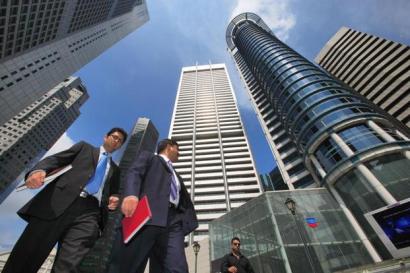
9 August 2015 Singapore celebrates its 50th birthday.
The city-state has grown to become one of a world’s most significant financial hubs and the most important one in the Asia Pacific. Today, ignoring some slight discomfort of a negligibly small community, Singapore is a finest example of a great state by many theories. Come to think of it, it has only been a country since 1965, after being expelled for economic and political differences by Malaysia.
Let’s take a look at this tiny island nation’s story, from a sleepy port city to a thriving first world in just 50 years, and lessons that can be learnt by the businesses.

- Uncompromising passion: A common characteristic of all successful entrepreneurs is that their obsession in whatever they do. Without passion for what you are doing, you might as well stay in a job you don’t like. The first and foremost ingredient to any business is the ‘passion’ and ‘confidence’ of the entrepreneur. The father of Singapore, for all intents and purposes, is Mr Lee Kuan Yew (LKY), who built Singapore into the island nation it is today, guiding it with his vision. LKY had spent most of his lifetime ensuring the well-being of Singapore and encouraged the fellow leaders to do so. Today it’s in their blood. He said in Hard Truths to Keep Singapore Going, “Singapore is my concern till the end of my life. …I have spent my life, so much of it, building up this country. There’s nothing more that I need to do.”
- Think long term and have a clear vision: Rome was not built in a day. Success needs time and sincere efforts. However, a crystal clear vision and flawless definitions of short and long term goals are imperative for success of any trade. Singapore is hugely indebted to LKY for his vision and determination. Today’s Singapore strategizes all its moves well in advance. Its social, economic, political landscapes are decided and devised 10, 15, or 25 years in advance. As I write this, Singapore has a vision for next 50 years with a clear working plan. In enterprises too, the challenge of maintaining a common vision between different departments is ongoing and vital. Identifying and communicating a clear vision is one of the most important functions a business leader. All business leaders should understand the basic elements of visioning and how to communicate a clear vision to its internal and external customers.
- Network and make strong allies: In spite of being just a dot in the atlas, Singapore worked hard to make a place in the world economic map. It created unparalleled diplomatic, military and economic relations with the bigger nations and boast of strong allies with US and Australia. Similarly, business is all about partnership and relying on each other strengths. Networking is business, period.
- Understand your threats, face the disadvantage bravely and turn them into your advantage: Singapore’s Deputy Prime Minister and Finance Minister Mr Tharman Shanmugaratnam explains this aptly in an interview by BBC Hardtalk in May 2015, “…We converted permanent disadvantage into continuing advantage. And that’s a very fundamental attitude of mind. ….We had every disadvantage you could think of for a nation and we did not expect to survive, we were not expected to survive.” After gaining independence abruptly, Singapore faced a future filled with uncertainties in 1965. Singapore faced the dangers of attack by the Indonesian military and forcible re-integration into the Malaysia Federation on unfavorable terms. Singapore developed rather rapidly its Armed Force and introduced the National Service for its male citizens just to stand on its own feet on the borders. For any business, realizing the threats and weaknesses are as important as to create a watertight business plan. No business has ever been made (ethically) big and successful without realizing the distress and discomfort of a possible breakdown. Failure or fear of falling on the face is motivation for driving ahead for all successful entrepreneurs.
- Strategic planning is not a good-to-hear management term: Strategic planning is important to an organization because it provides a sense of direction and outlines measurable goals. It is a tool useful for guiding day-to-day decisions and also for evaluating progress and changing approaches when moving forward. Singapore realized at a very early stage that it needed the foreign investments to make it big. It began by overhauling the economic structure of the country in order to attract Foreign Direct Investment and were successful. They are now one of the largest investors in foreign countries through their Sovereign Wealth Funds. The World Bank ranks Singapore as the world’s easiest place to do business. It is possibly the cleanest and safest metropolis in the world just to prove that all have been meticulously planned for and achieved.
- You got to do what you got to do: Singapore did and always does what it deems appropriate. That’s a culture developed by LKY. He was no saint himself and was often criticized from his iron-fisted rule and had once declared that, ‘if nobody is afraid of me I am meaningless‘. But LKY got most things right, especially in his choice of financial administrators and political leaders. Singapore kept government small, the economy open and regulation simple, transparent and effective. Effective business leadership is not a popularity contest. It’s about achieving results with integrity. Successful entrepreneurs make the right decisions and they pay little attention to the popular opinion. These leaders challenge common ideas.
- Emphasise developing the core areas and build your business around it: Almost all global leaders were skeptical of Singapore’s survival in 1965. Besides the issue of sovereignty, the persistent problems were unemployment, housing, education, and the lack of natural resources (drinking water) and land. We can’t imagine that was Singapore just 50 years back with present day’s scenarios of running drinkable water on the tap, a house for every family at a subsidized rate, proficient public transport, efficient public service and properly manicured greenery around. Successful entrepreneurs don’t try to be a ‘Jack of all trades’, but channelize all its efforts and energies to a focused area of know-how as per their business objective.
- Value your people: People make a difference, people create system and people also make a mess. Take care of your people. Singapore is a meritocratic society. Be it in the political system, education institutes or in public sectors, Singapore is committed getting the right talent irrespective of source. It invests heavily and aims to create a first-class educational system that allows Singaporeans of all backgrounds to rise up in the society and the corporate ladders. Business leaders, who value its own people and partners, take genuine care of them and believe in paying-for-performance, are the ones successful and robust.
- Be welcoming, honestly service oriented and expect low income to start with: Singapore discovered quickly that to gain an international recognition as an important nation and economic super power, it required skilled manpower and businesses. Though today it is one of a most expensive city to live in, until now it has a most favoring expats’ terms for world business leader’s to come and make it as their home. Individual and corporate tax is still one of a lowest in the developed countries across the world. There is no inheritance tax, wealth tax and capital gain tax. There is a great deal of emphasis on customer service which is apparent from dealing with taxi drivers to public sector employees.
- Don’t need a precedent to create one: Why follow suit at all when you can be as innovative as Singapore? Imitating other countries blindly is utterly unfathomable for Singapore. While almost all governments around the developed world are increasing all sorts of tax rates in the last decade, Singapore’s tax system has grown to be more and more competitive over the years. Singapore lends itself particularly well to entrepreneurs and professionals who generate the preponderance of their income online. It has a transparent legal system, safest banking jurisdictions in the world, and the government provides generous allowances for start-ups, royalties and intellectual property. Today, we need business innovators more than any time before. Every organization is feeling the impact of globalization, migration, technological and knowledge revolutions. Innovation brings added value and widen the employment base.
All in all, Singapore teaches businesses to evolve, adapt and re-invent itself. A classy example of a country which is run just as the corporates, successfully and efficiently.

